How am I finding you this morning? Worried? Stressed? Or somewhere in a place of contentment? I know such is crazy time with our to-do lists SO LONG and the suffering around our world at such a terrible place.
In all of this, what I most want to offer you today is peace. Peace: a state of tranquility or quiet.
But how you might wonder?
Well, I know this for sure, peace is a word we frequently use, and because of that it's easy to believe that peace looks like perfection. The right place. The right time. The right people all living together in harmony.
Many of us use this idea of peace as permission as to why we don’t act. When it’s the right time, we say, we will. (And that time never comes).
One of my favorite scriptures about peace comes from the prophetic text of Jeremiah, chapter 29. When the nation of Israel was in a exiled land they were advised to “Seek the peace and prosperity of the city to which I have carried you into exile. Pray to the Lord for it, because if it prospers, you too will prosper.”
Jeremiah's words here dispels this any sort of "wait till the right time" then you'll have peace mentality. Jeremiah wanted his listeners to seek the “peace” of the city where they were, even if it not where they wanted to be.
And by peace, I don’t believe he’s talking about contentment. Or being a doormat to injustice. (For there was so much not well in Jeremiah's purview just as there is ours). Instead Jeremiah encouraging peace from human-to-human connection. Seeing people, loving people right where you are.
Let me add this: several years ago, I found myself living in a city I did not want to live in. I had a horrible attitude about it. I exuded negative energy. And as much as I said with my mouth that I wanted to make peace with my circumstances, there was no way possible for this to happen. I isolated myself. My heart wasn’t open to seeing my neighbors. I wished I could be anywhere but there.
But slowly, I learned this lesson: when you pray for your surroundings to prosper (even if you don't like them) there’s hope for you to prosper in them.
Peace-making is always full of surprises!
How is there peace calling your name this week right where you are?
XO
Elizabeth
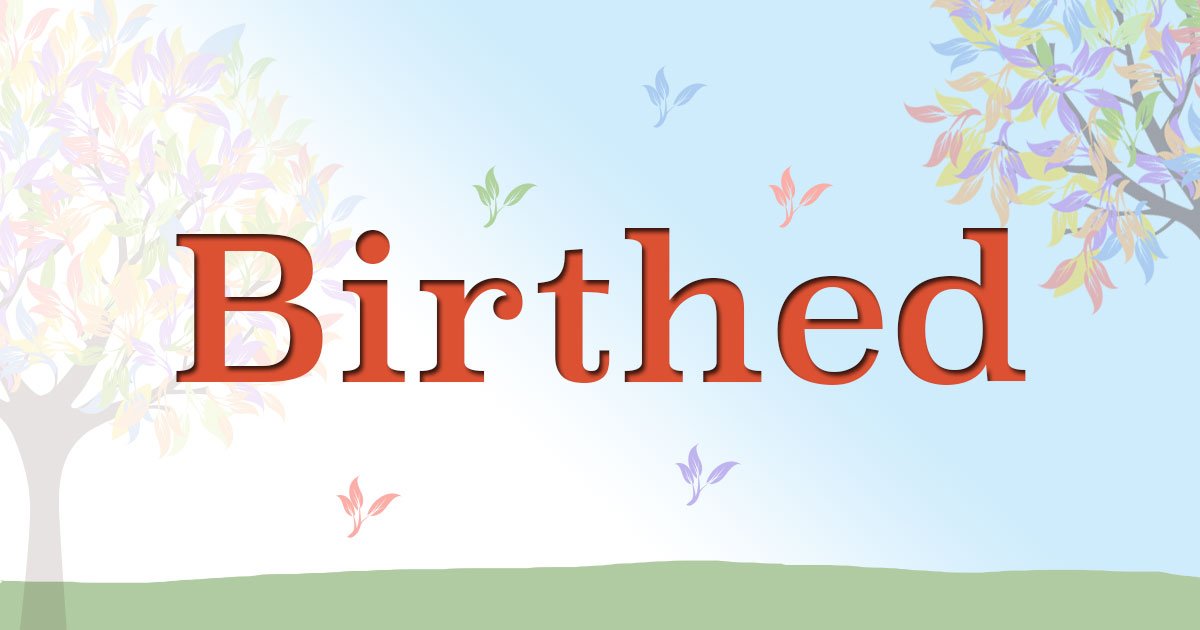
During these weeks of Advent, I’m thrilled to offer you the voices of some articulate storytellers— storytellers with wisdom to share about how their experiences of pain or loss is birthing in them something beautiful. Not in a Pollyanna sort of way of course, but in the spirit of what Leonard Cohen once wrote: “There is a crack in everything. That’s how the light gets in.”
Isn’t Advent is all about light shinning in the darkness?
I'm thankful for last week's post from Meredith Holladay. Today my friend Mary Wright Baylor-- who I met on twitter several years ago and recently discovered we were not to distant neighbors (how fun!)-- shares her poignant story of waiting in hope for better days to come.
--------------------------
Of all the seasons, fall is my least favorite.
With a July birthday, I adore summer.
I love the hot sun and heat, outdoor concerts, and fresh herbs in the garden.
As a child, I spent hours in the pool or ocean waves; I relished the freedom of summer and dreaded the return to wearing shoes and homework.
Later, as a young mother, the start of school continued to be a challenge; I missed my children and resisted the structure of homework and afterschool activities.
As a gardener, I find it melancholy to witness the end of the growing season, the harvest of flowers and herbs, the dropping leaves, and frostbitten blossoms. The shorter days and longer nights of fall take its toll on my energy and mood.
So, it was in this season in 2009, that I received a phone call that forever changed my life.
My sister-in-law called to tell me that her husband-my younger brother and the father of four-had tragically ended his own life. Totally devastated, I was overwhelmed to also hear “We need you to go tell your mom and dad.”
“Dear God in Heaven, how can I do that?”
I panicked that this shocking news would kill my elderly parents.
How could I ever tell my father, already frail from Parkinson’s disease and my mother, weakened by heart ailments, that their oldest son had died by his own means?
As darkness fell that September day, my husband drove me over to my childhood home.
I fervently prayed for God to be present, to give me strength, and to give me the language to break such horrific news. In reflection, I really don’t remember much of what happened the rest of that horrible night. Somehow, we managed our raw anguish and survived his memorial service. As we departed the church, I remember that the trees were turning color and the skies were filled with birds migrating.
Following this heart wrenching death, my father was markedly weaker and his Parkinson’s disease worsened.
In October, he was hospitalized twice for respiratory complications. As the daylight hours grew ever shorter, it was clear that his time with us was also drawing nigh.
On Christmas Eve, right after awakening from a nap, he suddenly stopped breathing. He could not be revived. With Christmas carols playing on the radio by his bedside, we surrounded our precious dad resting in peace.
Two deaths in three months. “Oh, God, give me strength! I cannot do this!” But somehow, I did.
On a frigid cold day in early January, I held my mother closely as the wind whipped in our faces and my father’s ashes were interred next to my brother’s.
My memories of the next couple of years are a gray blur.
Though working as a parish nurse, I focused all my energy on my mother. Always incredibly resilient and fortified by her deep faith, she was determined to live as fully as she could.
She continued to volunteer at church, to host family gatherings for holidays, and to join me on many outings. I remember taking her on a late summer day trip to the country. We commented that the fields of corn were drying up at the end of the season. Shortly after that, in early fall, her heart began to fail. As the days shortened and nights grew long, we took multiple trips to the emergency room. Hospitalizations kept me at her side. Though debilitated and homebound, my mother still enjoyed visits from her friends and delighted in time with my grown children. She was elated to learn that my oldest daughter, after several miscarriages, was nearing the end of her first trimester.
As fall progressed, my mother’s decline was marked and soon she was ready for home hospice care.
On a crystal clear November 14, while my remaining two brothers and I held her hands and sang “Amazing Grace,” my mother died very peacefully in her own bed.
With her death, my brothers and I had lost half of our family in three years. “Oh, God, what more do we have to endure?” How could we possibly write another obituary or plan another memorial service?
I was physically exhausted from caregiving for so long. But again, somehow, we found strength and we rallied. The date of her funeral was scheduled for the first Saturday in December on the first weekend of Advent. We thought our mother who loved the rituals of Advent would like that.
On the day before my mother’s service, my pregnant daughter called in great distress.
She had just left a routine ultrasound in which it was discovered that her baby had died in utero. I spent that day, waiting with my son-in-law in the lobby of the hospital as our dreams of our small bundle of new life ended. “How long, oh Lord, how long???”
I remember the dark, bitter cold of that winter. Numbness alternated with despair. How would I ever feel normal again?
Would I ever experience joy? How could I resume “life?” In the months that followed, I simply put one foot in front of the other. I struggled with my faith. “God, where are you?”
I didn’t know what to do other than to heed the psalmist and “to lift up mine eyes unto the hills.” Seasons passed.
And then, slowly and subtly, when I looked up, I began to notice. I noticed glorious sunsets and shooting stars. I heard the beating of a hummingbird hovering over flower blossoms.
I savored fresh basil and inhaled the fragrance of lavender in my garden.
God WAS present.
There was no Hallelujah chorus or trumpet tune. But there were clear signs of God’s omnipresence. By witnessing God at work, I began to heal. Indeed, I began to treasure time with friends and trips with my loving husband. I savored outdoor concerts in the summer and felt peace as waves lapped on the beach.
In this autumn of 2016, I was energized by clearing the bedraggled garden beds and making plans for new gardens next spring.
Perhaps for the first time, I thought that the changing tree colors were particularly vivid and brilliant. Walking our dogs in warm sun and then snuggling by a fire in the evening was cozy. Almost imperceptibly, I recognized that I was not dreading the pending anniversary dates of my family members’ deaths—rather, I felt a sense of peace and serenity.
With a distinct sense of God’s presence, I was not the least bit surprised when on the 4th anniversary of my mother’s death, on November 14, my daughter gave birth to a healthy little girl.
As my tiny granddaughter sleeps, I notice the rhythm of her breathing and feel the fuzz on her little head.
This is Advent. I know that God IS always present. Our cries ARE heard and they ARE answered. And as we are promised, new life WILL come.
After an incredibly fulfilling career in multiple roles and settings in nursing, Mary recently retired (again) as the pastoral care nurse at the Washington National Cathedral. Her “serious” time is spent in volunteering with her alma mater, University of Virginia School of Nursing and Moms Demand Action for Gun Sense in America. Mostly, though, she savors the role of grandmother and dachshund “mom.” An avid gardener, yogi, and social media, she eagerly awaits the retirement of her husband at the end of 2016.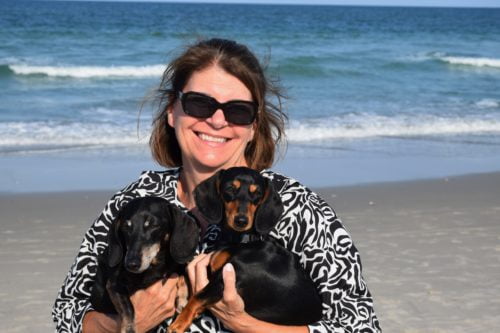
 Here we are: Advent week #2. Lighting the candle of peace each day.
Here we are: Advent week #2. Lighting the candle of peace each day.
Though it's the time of year that we sing "Let there be peace on earth."
Though it's the time of the year when we hear Amy Grant singing about her wish for "No more lives torn apart. And wars would never start."
Though it's the time of year when we long for and idealize moments of family harmony with everyone being under the same roof.
I'm not sure this is exactly what Advent's peace is all about.
I've been preaching this Advent over at Springfield Christian Church in Springfield, Virginia and I have been struck by the Isaiah lectionary readings that . . .
Peace is often nothing like we expect.
Consider this: there are places we expect to see beautiful growing things, aren’t there? A greenhouse, a tropical vacation spot, Disney World.
But then there places we wouldn’t expect to find anything new or life-giving.
Such would be the tale of the house that Kevin and I lived in for 5 years before selling the property (thanks be to Jesus) over a year ago.
In a historic neighborhood, large oak trees filled every corner of the street. Sure, these trees were trees were lovely to gaze upon in the spring time, but when it came to this time of year, the trees rained leaves and leaves and leaves.
I’d be raking, blowing and blowing leaves some more often up until nights before the prediction of the first snow.
No matter how hard we worked to remove our yard of them, they never seemed to go away. We always seemed to keep some from fall to fall no matter if we wanted to our not.
We’d ask for input from some great landscapers only to hear each one of them say, “Well, have fun growing moss.”
Of course, we could have cut some of the trees down to solve our problem, but the neighborhood had some rules about that and who had 10,000 of dollars lying around just for “tree removal?”
So . . . with our “throw our hands up in frustration” approach to our yard, I never tried growing anything even though I love flowers and the idea of fresh tomatoes.
I affectionately referred to our yard the Hagan wasteland.
However, I remember one March walking outside in the crisp of the morning in shock.
Before my eyes stood tulips breaking forth from the rocky ground.
I wanted to shout, “How in the world did my desolate yard grow something so beautiful?’
Because let’s review: we did not till the soil. We had not planted any seeds. We didn’t even remove all the leaves from the flower bed months before.
Yet these were gorgeous pink, white and yellow tulips. I couldn’t stop staring at their loveliness.
If you’ve ever had a surprise in your backyard or somewhere you’ve visited, then you’re in the perfect emotional spot to hear this word from Isaiah 11:1:
Isaiah offers this prophetic word, “A shoot shall come out of the stump of Jesse, and a branch shall grow out of its roots.”
It’s equally unthinkable vision of the future both for the time and place over which it was spoken and the image it presents.
Think about what a dramatic metaphor this is? A branch growing of a stump. There’s nothing more dead than a stump, isn’t there?
For we know, right that a stump the remains in the ground of a tree that has been cut down. It might have been great at one time but is no more. And it’s an unsightly part of any yard or forest patch, isn’t it? So much so that when we do have trees removed from our yards we often ask for the stump to be dug out as well. What good is a stump in the middle of a patch of earth?
Stumps tell stories of death—and who wants to be reminded of that?
I had a neighbor once who told me of her difficulties selling her house because the giant stump in the middle of the yard was perceived as an eye sore. So much so that her real estate agent came and made her plant a flower bed over the top of the stump. And it worked—days later with the disguise in place she finally got an offer.
Yet, Isaiah says this unthinkable word about a stump that has nothing to do with ignoring it or covering it up. “A shoot shall come out from the stump of Jesse, and a branch shall grow out of its roots.”
But here’s the heart of Isaiah’s message. Death was not the end of the story: “A branch shall grow out of [the stump’s] roots.”
 As I was sitting with this text last week, the image that came to mind for me was of a stump with a Charlie Brown like Christmas tree growing out of the top—small, fragile branches with a few leaves on each stem. Can you see it too? Shockingly brilliant in its existence.
As I was sitting with this text last week, the image that came to mind for me was of a stump with a Charlie Brown like Christmas tree growing out of the top—small, fragile branches with a few leaves on each stem. Can you see it too? Shockingly brilliant in its existence.
Contextually this image is helping us see that God had a plan to reconcile not only Israel, but all of humanity. A branch would soon be growing out of a dead stump. This plan would also be shockingly brilliant in its existence too.
And in a couple of weeks, we’ll all start talking about “For unto us a child is born and unto us a Son is given.”
We'll talk about a movement of God that was birthed in a sleepy little town, in disdained tiny stable and attended by some unknown shepherds.
We'll talk about some swaddling clothes.
But we’re not there yet—
I think in the waiting God wants to expand our imagination of what peace looks like.
Jim Wallis, founder of Sojourners tells the story about a trip he took to South Africa in 1987. Nelson Mandela was still in prison. Segregated everything was alive and well.
During his trip, he said, "I met a 14-year-old boy who was, like many, organizing in elementary and high schools [toward social change]. I asked him if he was optimistic for the future and he said, 'Yes.' [Then] I asked him if he thought there would be a new, free South Africa someday, and he stated to me matter-of-factly, 'I shall see to it personally.' ...There is simply no other alternative than for each person to see to it personally."
Though we all know in 1994 this boy’s vision became a reality, you can imagine how crazy he sounded in 1987? Reconciliation in South Africa in his lifetime? Release of Nelson Mandela? He had to be kidding, right?
And I believe, the vision of this South African boy is what Isaiah 11 is begging us to see—a world where peace actually happens.
One of my professors from seminary Dr. Portier-Young puts the message of the text like this, “This is the promise, the glorious, abundant resting place where the root of Jesse stands. This is the vision of security. The shoot will grow tall and become a visible sign for the nations. Not a battle standard, but a standard of peace.”
Or simply put- God’s reconciliation work looks as wonderful and as laughable as this. Peace looks like this. New life coming from what is really dead.
So do you have something dead in your life? Then open your heart up to expectation. This is where the peace is going to come.
A sermon preached at The Federated Church, Weatherford, OK . . . Mark 1:1-8
Our lives get really busy this time of year, don’t they?
Parties to attend. Presents to buy. Family celebrations to prepare for . . .
Even look at the back of the bulletin this morning and you’ll see a list long of upcoming activities, more than usual around here.
But over the next couple of Sundays in Advent that you’ll hear my voice from the pulpit, we’re going to be talking about what it means to find space in our lives We’re going to talk about what it means to spend our time in ways that bring us closer to that One we are waiting for. And we’re going to practice making room for more of the Christ child to be born in us.
I hope that worship can SLOW us all down a little.
Not just in clique ways that could be summed up by the popular statements like: “Jesus is the reason for the season” or “Don’t take Christ out of Christmas” but truly opening our lives for more of the Son of God, God with Us to come in.
As we look at our lections for today, Mark’s gospel opens by declaring the fulfillment of a prophecy text from Isaiah 40:
“It is written in Isaiah the prophet, ‘I will send my messenger ahead of you, who will prepare your way, a voice calling out in the desert, prepare the way of the Lord.”
 And this messenger’s name is John. Or more properly known as John the Baptist.
And this messenger’s name is John. Or more properly known as John the Baptist.
John was the messenger of preparation—the greatest opening act that there ever was, telling the people who gathered around him in the desert that something really good was coming and they needed to make room in their lives to receive it.
John was an unlikely opening act. We learn a few things about him in Mark 1, verse 6. He lived in the desert. He wore clothing made out of camel’s hair. He wore a leather belt around this waist. His diet consisted of wild locust and honey. What a description!
John the Baptist was man who was of the land, who lived off the land, and who had a simple message: a baptism of repentance for the forgiveness of sins.
And though we hear a version of John’s story read every Advent, it’s one, I think, that all of us have a hard time relating too, given our place in history and geography. For we don’t live in remote desert and John simply sounds like a deranged character we’re not sure that we’d ever want to meet.
But might there be something the setting of this one preparing the way, that might tell us something about what making room for Jesus is all about?
I think it is no coincidence that John asks the people to repent and be baptized in the desert.
The desert is a lonely place.
The desert is a quiet place.
The desert is a place with few distractions.
The desert gives our hearts space that they don't otherwise have . . .
And throughout the centuries, it has been the place where spiritual seekers have gone to find God.
And it just so happened that this week I spent time in the desert of Northern Kenya, in the county of Turkana that isn’t too far from Sudan. I wasn’t on a spiritual pilgrimage but Kevin and I along with several members of our staff in Kenya traveled to visit programs through Feed the Children.
It began like this: we took a small charter plane to an airstrip in the middle of the true definition of “no where” to then take a van on an hour drive to the 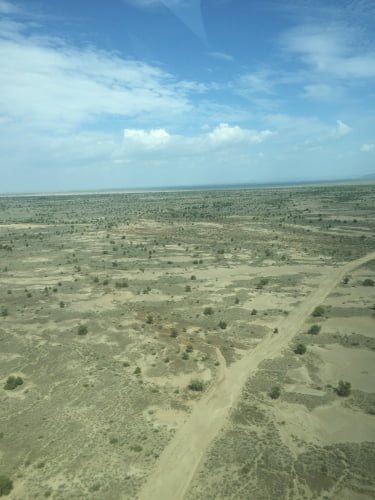 community of the Turkana people.
community of the Turkana people.
As we traveled the dusty roads with barren trees and goats and wild camels roaming around, the feeling of starkness was overwhelming. Wide-open spaces with few people and homes made out of tree limbs and covered with animal skins filled our vision.
There were no stores. There were no street signs. There were few cars, if only just ours for miles and miles.
The thick heat of the desert warmed our van, even with the air conditioning blasting. I told Kevin we’d better put thick layers of sunscreen on if we didn’t want to be complete toast by the end of the day.
It was like being in the pages of National Geographic as our van pulled up to the school where Feed the Children donors recently built a multifaceted water aquifer powered by solar panels (so that the Turkana people didn’t have to walk over 10 miles one way to the nearest water source).
Women dressed in brightly colored wraps with multicolored necklaces around their elongated necks greeted us with dancing and song. The male elders of the community soon took Kevin by the hand and made him an honorary chief completely with a staff, stool to sit on and a hat made of ostrich feathers. Children followed us around in torn clothing and flip-flops made of old tires on their feet.
And though we could have easily judged this way of life as backward or disorganized or even said to ourselves, “How could these parents allow their children to grow up like this?” upon deeper observation we saw there was a bigger picture of what life is like in the desert.
Life, you see, in the desert looks clear in ways that it doesn’t in the hustle and bustle of city and town life. We can’t hide behind gadgets. We can’t pretend that we can go it alone. We can’t waste anything that could be used for the common good.
In the case of Turkana, we learned that the desert gave those we met rhythms that governed their life together including respect for the land and thanksgiving for life’s most important blessings: food, water and education for their children. And most of all, in the remote location, they knew they needed each other. They belonged together and organized themselves accordingly. There was great clarity in who they were and what they were about.
And, being in the actual desert this week convicted me of many things—
And for all of us, we have a lot to learn from the desert and those who dwell there.
But what if you never live or visit a place like this? It doesn't matter. Deserts can be anywhere. We can all slip away from time to time into spaces—even if they are just mental places where our phones are turned off and our minds are at rest.
This is what I know: you and I are never going to be ready to meet the Christ child this Christmas if we aren’t willing to alter the practices of our lives, to go to places of solitude where we can hear the God, where we can remember what really matters in life and can turn away from what keeps us from having room for Jesus.
Catherine de Hueck Doherty, a Christian teacher and activist wrote while serving amongst the poor in Canada in the 1960s this about making room for God saying that solitude is not about the fantasy of a cute little cabin in the woods or spending a week chanting with monks.
No, I think Catherine would propose that we could find “deserts” right here in Weatherford, OK (or wherever we live).
Catherine writes: “One of the first steps toward solitude is a departure. Were you to depart to a real desert, you might take a plane a train or car to get there. But we’re blind to the “little departures that fill our days. These “little solitudes” are often right behind a door which we can open, or in a little corner where we can stop."
Catherine goes on say what these desert moments can be saying: “Consider the solitude that greets you when you enter your room to change your working clothes to more comfortable ones . . . Consider the solitude of housewife, alone in her kitchen, sitting down for a cup of coffee before beginning the work of the day.”
I would add the solitude of the moment you first open your eyes in the morning.
Or the solitude of brushing your teeth after showering.
Or the solitude of driving to work in the morning, without the radio on.
These are all places where we don’t have to do anything different from we otherwise would, but moments when we can be aware then, stop and know who is God.
Because I believe, just as John the Baptist taught us that real life re-alignment does not take place in the fast paced, over crowd space that you and I live in. Especially in a season like Christmas where everybody wants us to be somewhere doing something that seems really important at the time.
No, God leads us to spiritual deserts.
So, I want to tell you this, if we want to make room for Jesus this Christmas, you and I are going to have to stop, we’re going to not let the moments of “desert” that find us pass us by.
And if you’ve been trying to live the Christian life for any time, I bet you know what I mean when I say pay attention to the still small voice that speaks to us saying, “This is my path walk in it” or “Come away with me, my Beloved."
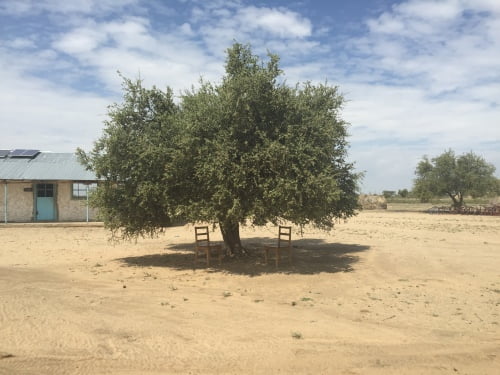 For this is what making room for Jesus is all about. For when we make room in our days to be present—I believe, and then the Holy One also becomes present to us. Not because the Holy has ever gone anywhere or left us, but these are the times we have the capacity to listen!
For this is what making room for Jesus is all about. For when we make room in our days to be present—I believe, and then the Holy One also becomes present to us. Not because the Holy has ever gone anywhere or left us, but these are the times we have the capacity to listen!
And let me say this--- we live in a culture where practices of mediation, yoga and silent retreats are all the rage. And they are great practices with great health and mental benefits. But we can’t stop here.
Going to the desert, finding solitude means nothing unless we aren’t led as John the Baptist was--- to the One whose sandals he was unworthy to untie.
For it’s the ultimate calling of Advent—to make room for Christ.
He's the light that can make the most unhappy of us this Advent open our heart to believe again.
He's the light that can break through the coldest of hearts, the most horrid of circumstances to hope again.
He's the light that can touch our souls in expressions beyond words to know that peace that passes all understanding.
So this morning, Calling all dreamers . . . calling all wanderers . . . calling all grieving friends who think you can't possibly live through another Christmas . . . calling all those who want a life different from you see right in front of you right now. The good news has come. And it is in the desert.
Come, and receive what you are most longing for this Advent: a deep abiding peace. Darkness will be over soon. And, peace will reign in our hearts.
AMEN
A shoot will come up from the stump of Jesse;
from his roots a Branch will bear fruit.
The Spirit of the LORD will rest on him—
the Spirit of wisdom and of understanding,
the Spirit of counsel and of might,
the Spirit of the knowledge and fear of the LORD—
and he will delight in the fear of the LORD.
He will not judge by what he sees with his eyes,
or decide by what he hears with his ears;
but with righteousness he will judge the needy,
with justice he will give decisions for the poor of the earth.
He will strike the earth with the rod of his mouth;
with the breath of his lips he will slay the wicked.
Righteousness will be his belt
and faithfulness the sash around his waist.
The wolf will live with the lamb,
the leopard will lie down with the goat,
the calf and the lion and the yearling together;
and a little child will lead them. Isaiah 11:1-6
I lay on my back, my mind and body numb from the shock. Both of my hands rested on the warm, squishy lump that the midwife had deposited on my chest. I couldn’t see her, but she felt like a wet puppy – one of those wrinkled puppies with rolls of extra skin. I remembered the woman in the birth video I had watched weeks before. She had delivered an eloquent speech to her newborn son, exclaiming, “My son! My little son! Welcome to the world! I am so glad you are here!” It had seemed like a good way to welcome someone into the world, and I had resolved to welcome my daughter with a similar speech. But now my legs shook with fatigue, and my tongue was thick with exhaustion.
It is Christmas morning. Jesus is a warm, wet, puppy-like lump resting on Mary’s chest. And some of us are singing and saying, “I’m so glad you’re here!” But at my house, the children are allowed to get out of bed and wake us up any time after 5am…so here at my house on Christmas morning, on this birth-day morning, I find myself a little sleepy. I find myself living into an exhausted peace that I have come to know well.
The truth is that my first child was born six years ago, and I haven’t yet stopped being tired. It has been six years, and we still wake up in the middle of the night for sounds and tummy aches and trips to the bathroom.
New life grows slowly. New life grows up into the world slowly. But in its slow coming we learn the practices of peace. In the midst of welcoming new life into the world, we learn God’s shalom; we practice God’s wholeness.
In the six years since I gave birth, I have learned to listen when small people whine. I have learned that the whining represents need and want and endless desire. I have learned to clothe the naked and feed the hungry….three, four, and five times a day. I have learned that today’s acts of feeding and clothing don’t affect tomorrow’s needs. I have learned that when I feed and clothe someone every day they will love me with a wild, devout, and startling love that no one could ever deserve. I have learned that this startling love comes in picked flowers, giggles, and hugs with a running start….and I have felt that kind of love heal my wounds powerfully and inexplicably.
I am learning the practices of peace, and my little children are leading me into them. It is slow work. I am frequently exhausted. But peace is coming into my world.
It is Christmas morning -- Jesus is born! Now we begin the slow and steady work of patiently raising the Prince of Peace into the fullness of his kingdom. Grab a diaper, and join the movement; the work of nurturing a baby Savior is at hand.
Let us pray:
Jesus, we are so glad you are here! Forgive us when we are too exhausted to say so. Empower us for the slow, daily work of nurturing your Body. Teach us the practices we need to be your peaceful people. And give us what we need this day to rejoice in your coming – we are, indeed, so glad you are here. Amen.
 Sarah Jobe is an ordained Baptist minister, prison chaplain, teacher, and mother of two. She lives with her family at the Rutba House, a Christian house of hospitality in Durham, NC. She is the author of Creating with God: The Holy Confusing Blessedness of Pregnancy. As a prison chaplain, she is hoping for the reconciliation of mothers and their children this Advent.
Sarah Jobe is an ordained Baptist minister, prison chaplain, teacher, and mother of two. She lives with her family at the Rutba House, a Christian house of hospitality in Durham, NC. She is the author of Creating with God: The Holy Confusing Blessedness of Pregnancy. As a prison chaplain, she is hoping for the reconciliation of mothers and their children this Advent.
And there were shepherds living out in the fields nearby, keeping watch over their flocks by night. An angel of the Lord appeared to them, and the glory of the Lord shone around them, and they were terrified. But the angel said to them, “Do not be afraid. I bring you good news of great joy that will be for all the people. Today in the town of David a Savior has been born to you; he is the Messiah, the Lord. This will be a sign to you: You will find the baby wrapped in cloths and lying in a manger.”Suddenly a great company of the heavenly host appeared with the angel, praising God and saying, “Glory to God in the highest heaven, and on earth peace to those on whom his favor rests.” Luke 2:8-14
I used to think that finding peace was impossible as a bereaved mom. In the months after Ethan’s birth and death, the devastating reality of all that I had lost could burst in on me anywhere. It might happen as I walked past a pregnant woman with a beautiful round belly on the street, or when I accidently turned down the wrong aisle in the grocery store and found myself surrounded by baby bottles and tiny terrycloth bibs, or when I opened the mailbox to find a store flier filled with rosy-cheeked infants. The world was full of reminders that I had been a mother and that my child was gone forever.
In the months after my son was born and died, I had to stop listening to the news on the radio or reading the newspaper. Nearly every story seemed to lead back to the shattered heart of a mother whose child had been killed, gone missing, been deported, gotten locked up in jail, or done something so terrible that it could never be undone. I could feel the grief of these other mothers as if it lived in my own chest. It took my breath away, knocked me off my feet, left me weeping over my breakfast or my computer screen.
Even now, four years later, moments of grief catch me by surprise, leaving me breathless with the fierceness of my longing for my missing son. But slowly, as the years have gone by, I have learned this: One of the gifts of loving Ethan is the gift of a troubled heart.
The peace that the angels announced at Jesus’ birth was not the peace of a calm and untroubled soul. It was shalom – the peace that comes when a whole community flourishes, when everyone has enough, when no mother is torn unnecessarily from her child, when no child begins life in dire circumstances. It is the peace of a community that is ruled with a kind of justice that takes the needs of everyone into account. It’s a peace that can be measured by the well-being of the most vulnerable members of a community.
Ethan was one of the most vulnerable human beings you could possibly imagine – a newborn who was disfigured and disabled, who never cried or even took a breath. His tiny body was broken beyond repair, his brain was incapable of gaining consciousness. There was nothing that could be done for him except to love him as he was.
And loving him cracked my heart wide open. Everywhere I go, I see children like Ethan – vulnerable and beautiful, gifts from God. And everywhere I go, I see moms like me – filled with a fierce unquenchable love for the children they have carried in their wombs, in their arms, in their hearts.
I see them now, and I cannot forget them – the mom who pulled into our church parking lot to wait out an immigration checkpoint with her toddler, the mom from my neighborhood who has watched her beautiful teenage boy get entangled with a gang and locked up in jail, the mom who just turned 80 and has no one to care for her disabled daughter when she is gone, the pregnant mom whose husband’s mental illness keeps them on the run from city to city without a roof over their heads or enough to eat.
It is not an accident that the sign of the arrival of God’s reign of peace was a newborn infant born in a livestock barn to peasant parents who would shortly become refugees. At the heart of this story of peace are the little ones whose lives crack our hearts wide open, leaving us troubled and longing for the day when God’s reign of peace will reach every corner of creation and provide a safe and sheltered space for the most vulnerable among us to flourish.
Let us pray:
Come, Lord Jesus, and trouble our hearts with a longing for your reign of peace. Amen.
Dayna is a member of Durham Mennonite Church (Mennonite Church USA) and part of the Rutba House new monastic community. She and her husband Eric live in the Walltown neighborhood of Durham, NC and are parents of one living son, Noah. Their firstborn son, Ethan, was born and died in 2009. Dayna is hoping this Advent for a heart open to God’s longings for the most vulnerable among us.
Jesus said: “Peace I leave with you; my peace I give to you. I do not give to you as the world gives. Do not let your hearts be troubled, and do not be afraid.” John 14: 27
I have waited with many who are waiting to have children. Often this path is not full of peace.
My daughter found the pathway to peace to be a difficult one. As they were thinking about a second child after having the first one through an IVF procedure, she asked, “Am I being selfish in pursuing this a second time? Am I trying to play God?”
God gave her peace when God spoke to her heart that in whatever direction they took, God was still in control, and that her desire to pursue God’s will was enough. They had a second child, a beautiful boy.
After this IVF procedure they froze two embryos, so having a third procedure was not a hard decision for them. They were open to having more children. But, then they miscarried.
My daughter found herself asking, “Why?” Finally, realizing that her question would most likely not be answered, she asked God to give her peace with the two sons He had given to her. She says that “there came a day when God revealed to me that these two were all I needed, and I was okay. Since then, I have realized that I need to simply pursue God more than pursuing anything else, and that is enough.”
Peace, as the world defines it, comes when life is in the order you want it to be -- enough money, the right family, the right place to live, on and on, and so peace, when it seems to come, is only fleeting and shallow because life is always changing. The world’s peace does not last.
But as I see it, the “the peace of God that transcends all understanding” can only come from knowing that we are secure in our Father’s hands, that God knows what God is doing with our lives even when we don’t have a clue, and that loving us and transforming us into looking like Jesus IS Jesus’ way. “Glory to God in the highest, and on earth peace to humankind on whom His favor rests,” the angels say to the shepherds.
With my daughter, like so many of us who are waiting this Advent, peace is something we learn.
When life is exploding around me, I have to purpose to remember that God loves me and peace will come as I receive. When I am covered up in insecurity and fear, I am to remember that I am God’s treasured possession and that God will not let go of me and peace will come. When I am degrading myself, I need to learn to receive His words over me that I am the “apple of His eye” and peace will come.
One who is learning God’s peace doesn’t have an anaesthetized look, where she is bleary eyed or in denial of the rigor of life, but one who can have a holy boldness to go on (even when she is shaking within), knowing that “our momentary troubles are achieving for us an eternal glory that far outweighs them all. So we fix our eyes not on what is seen, but on what is unseen. For what is seen is temporary, but what is unseen is eternal.” (2 Corinthians 4: 17, 18 NIV) In essence, peace comes through relationship.
Israel only had peace from staying in relationship with Almighty God. When they strayed from the relationship, war came, captivity came, and darkness invaded their souls. Ironically, Jesus came during the time of “Pax Romana,” a forced military peace imposed by the Roman Empire, but their forced peace only rendered moral decay, confusion, and frantic searching. Jesus came and brought the peace that the world could not give, the peace that comes only through being in a vital and vibrant relationship with Him. When the angel came to Mary and told her she would become pregnant through the Holy Spirit, she said, “How can this be?” When told, “Nothing is impossible with God,” she proclaimed, “I am the LORD’s servant. May it be to me as you have said.” God’s peace gave her the strength to be the mother of the Son of God!
Our exhortation is to be like Mary saying, “May it be to me as You have said, LORD?” and as we do, as we obey, as we seek relationship with Him, peace will come.
Let us pray:
I want to stay focused on You, Jesus, not on all of those things that deprive me of the peace that You have to give to me. Jesus, show me again and again that You are enough, and that in You, “SHALOM” will come. Amen.
Beth Dotson resides with her husband Danny of 42 years in Signal Mountain, TN. She is Presbyterian and is presently working in a ministry that serves HIV clients. She loves her family dearly, has five grandchildren, plays in the outdoors in all kinds of capacities with her husband and their black lab, Zeke. Her desire for her advent is that we would wake up to its wonder and how that wonder translates into the miracle of the mundane in our lives.
Fourth Sunday of Advent
There was also a prophet, Anna, the daughter of Penuel, of the tribe of Asher. She was very old; she had lived with her husband seven years after her marriage, and then was a widow until she was eighty-four. She never left the temple but worshiped night and day, fasting and praying. Coming up to them at that very moment, she gave thanks to God and spoke about the child to all who were looking forward to the redemption of Jerusalem. Luke 2: 36-38
These last five years, my prayers have often included these words over and over again: “How long O Lord? How long will you keep us childless?”
There’s not a lot of peace in this. Asking for the same thing over and over. Being stuck.
I’ve heard from a lot of couples dealing with infertility the feeling of being “stuck” in an endless process without a lot of hope, and it is frustrating beyond words. It is so easy to feel perpetually impatient.
Our culture helps us learn this kind of impatience. If we want something, we are told to make it happen now. If we don’t get what we want, we are told to try harder or take another route. If we want babies and can’t have them, there’s a specialized field of medicine for this. There are adoption agencies ready to receive our applications.
But sometimes even when we do all the right things and open ourselves up to all the kinds of possibilities that the Spirit could move forth in our life, we still find ourselves with empty hands waiting.
On my own waiting journey, Simeon and Anna have become two of my waiting heroes. Night and day both of these seniors devoted themselves to prayer and waiting for Jesus to arrive in the temple. They waited and waited. And they waited some more.
Scripture tells us that Anna was 84, a widow for many years. Her entire purpose after her husband died was to be on this waiting journey—to be that prophetic voice that spoke the truth about baby Jesus who was yet to be born.
And then one day Jesus arrived at the temple with Mary and Joseph. Anna knew immediately who Jesus was and blessed him in a way only someone who had been waiting for years and years could offer. She spoke truth. Jesus was God’s Son. Jesus would be the one who redeemed Israel. Jesus was God with us.
Though a vocation of waiting is not something I would have chosen (and I wonder if Simeon and Anna would have chosen it either?), I have come to realize that the longer I wait, the more peace-filled my waiting becomes.
Of course there are days when I still want to throw complaints up to the heavens of “Why me?” But more often now, contentment lives in me where dread used to be. This doesn’t mean that I’ve given up on my calling to motherhood either. I know I will be a mother to some little person sometime in my future.
But in the meantime my path is filled with meaningful work, and I wait. I find peace along the way. Who I am right now is ok. What I am doing right now is good. When children come into our home, we’ll be ready. Where the next step of our journey will take us, I do not know. How our waiting will come to an end, only God knows.
Deep peace. Deep peace of Christ to you as you wait on this day.
Let us pray:
God who waits with us, help us have the strength this day to wait with you. Help us to wait with the big unknown questions of our lives. Help us to wait when we see others so easily having what we want. Help us to find your gift of peace along our own journey of waiting. Amen.
Elizabeth Hagan is an ordained minister in the Baptist tradition, a freelance writer and a social media consultant who divides her time between Arlington, VA and Oklahoma City, OK with her husband Kevin. She blogs regularly at “Preacher on the Plaza” (https://elizabethhagan.com). This Advent Elizabeth is hoping for the gift of being present in the moment.
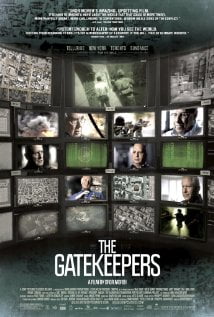 I love independent theaters. I love films that may or may not get press or bring filmmakers lots of money, but present a message through their art medium that make you think. I love films that stir up conversation long after the credits roll.
I love independent theaters. I love films that may or may not get press or bring filmmakers lots of money, but present a message through their art medium that make you think. I love films that stir up conversation long after the credits roll.
For me one such film I recently watched in the documentary called Gatekeepers. While nominated for an Oscar, winning a Cinema for Peace honor and getting rave reviews from the critics, I'd never heard of it until I was browsing the options for a movie night.
I read the description: "A documentary featuring interviews with all surviving former heads of Shin Bet, the Israeli security agency whose activities and membership are closely held state secrets" and was immediately intrigued.
Maybe this just sounds to you like a nerdy way to spend a night out (and I fully admit here my nerdy status), but in actuality my interested piqued from the fact I spent 10 days in Israel alongside a Inman, a Rabbi, and evangelical pastor in 2011.
It was a trip that brought my mind and spirit to the center of the crisis of the Middle East in ways that just don't leave your heart when you return home.
We called our trip a "delegation of peace." And though it is usually every pastor's dream to take a tour to the Holy Land at some juncture in their ministry (and I was one of them)-- this was not your normal journey to the Holy Land.
We traveled to intentionally together to explore the conflict between the Palestinians and the Israelis in the eyes of one another. We wanted to explore the sights important to each of our religious traditions, as children of Abraham, with an openness to learn without our natural biases. We sought to meet with peacemakers on the ground on both sides. And, we wanted our congregations/ places of worship to grow in friendship with one another when we returned home.
Throughout the journey, I came to believe there is no better way to see Israel and the Palestinian territories than with an Rabbi and Iman by your side.
For the Holy Land is more than about the life and work of Jesus, as many Christians bulldoze their way into the country in big tour buses-- it's the center of history our friends in the Jewish and Islamic tradition as well, meant to be respected and honored.
Now, I can't imagine going back to Israel any other way or a conversation about the region without consideration for the perspective of both Israel and their Palestinian neighbors.
I loved that Gatekeepers took me back to this place of learning and reflection on the complexity of history, politics and ideology that shapes the current state of affairs in Israel today.
I appreciated that Gatekeepers showed the humanity-- both the good and not so good-- of the Shin Bet, Israel's security agency. Sometimes the best decisions that could have been made at the time occurred-- and sadly innocent people died anyway. Sometimes poor choices in security cost hundreds their lives (and livelihood). Sometimes top Shin Bet official wept for lives lost and also wished for a better way of relationships between neighbors (as much as they were/ are labeled the "bad guys").
I appreciated the commentary on religious leadership within the region-- highlighting the crucial role such leaders play in persuading the hearts and minds of people, for good or evil.
I appreciated the fact that the film ended without a political message of either pro or against Palestinian statehood and/ or a new Middle East peace agreement BUT with the statement that peace will come through friendship. It's not the message I expected-- to be pro greater military occupation or even different new political leaders. But, simply friendship. Peace through friendship.
Go out and see Gatekeepers with a friend! You'll be glad you did.
By the way, our group blogged our way through the journey, if you are interested in more specific reflections check out our trip website hosted by George Mason University).
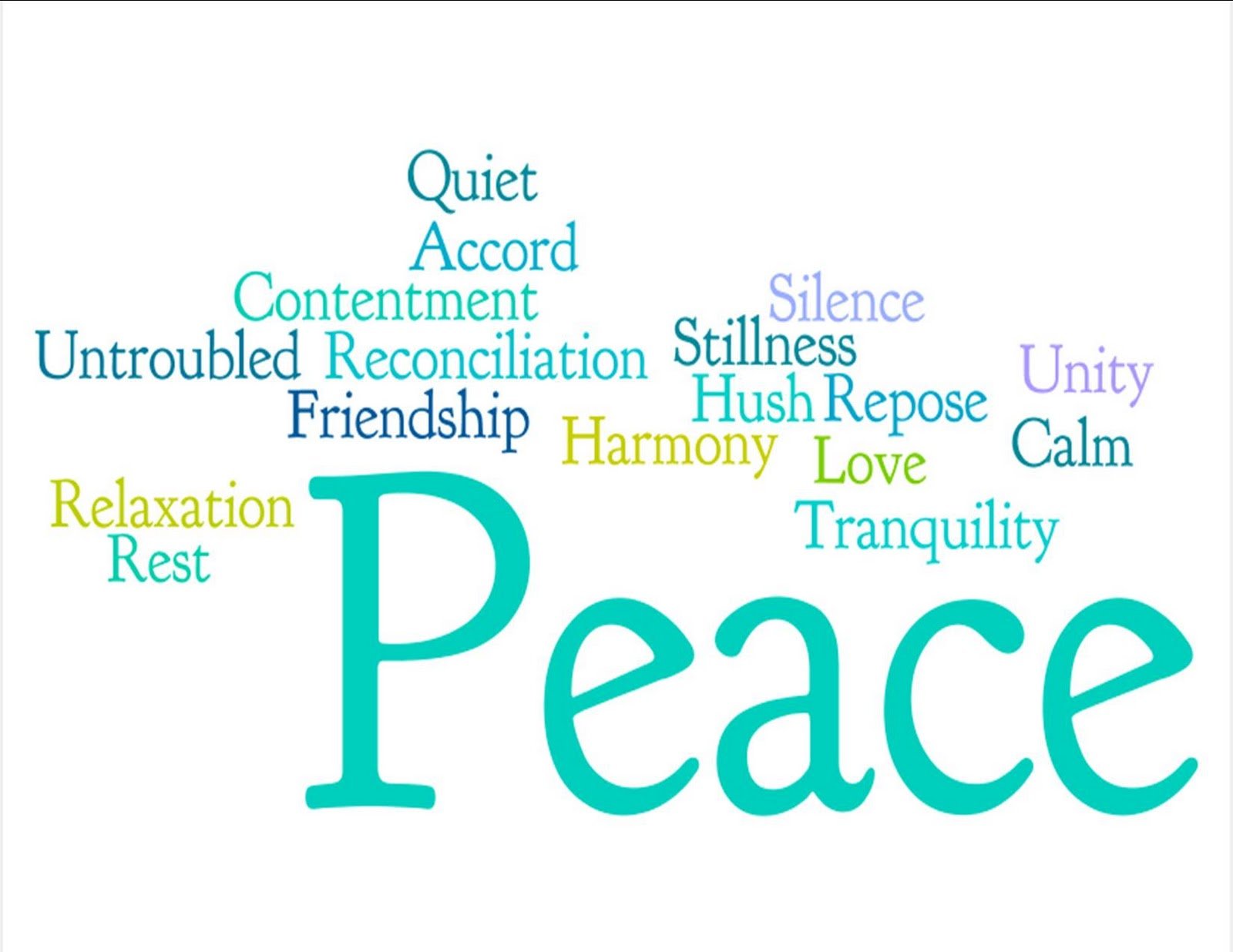 Now, two Sundays deep into Advent this year, Washington Plaza as a member of the larger Church is doing some serious thinking about peace. Where are their places in our lives in need of peace? What can we do to bring about more peace in this world as a community?
Now, two Sundays deep into Advent this year, Washington Plaza as a member of the larger Church is doing some serious thinking about peace. Where are their places in our lives in need of peace? What can we do to bring about more peace in this world as a community?
Instead calling Advent a "Sunday only" thing, we are encouraging our members to be mindful of waiting and watching all week long (as we do a series of devotions together) and gathering in particular Wednesday nights for song, reflection and prayer. At our Advent Vesper Service tonight, we will be singing and praying for peace. I wanted to share it here with the hopes that you might be praying too:
This year as we sing Silent Night with its echoes of calm and heavenly peace, we say a prayer for all who live in homes where peace is absent. For as much as we speak of peace, we know for many it is far from their reality of life.
Sing: Silent night, holy night, all is calm, all is bright. Round yon virgin mother and Child. Holy Infant so tender and mild, sleep in heavenly peace, sleep in heavenly peace.
We pray for children who live in fear, whose homes are not a place of safety, but a place of physical and verbal beatings.
We pray for seniors and other vulnerable people whose caregivers do not care as they are neglected or degraded.
We pray for all who are emotionally abused, and who are not loved, honored and cherished as beloved children of God.
Sing: Silent Night, holy night, wonderous star, lend thy light. With the angels let us sing Alleluia to our King, Christ the Savior is born! Christ the Savior is born.
We pray for women who have had to flee their homes or are afraid to flee their homes in lands where they are mistreated simply because of gender. We pray for all who have been sexually violated, and who are haunted by fear of violation.
We pray for those in prisons, holding out hope that someone cares for them, even when all life's dreams seem lost.
May love's pure light this season empower us to come to the aid of your hurting people.
Sing: Silent night, holy night, Son of God, love's pure light. Radiant beams from Thy holy face, with the dawn of redeeming grace, Jesus Lord at thy birth, Jesus, Lord at thy birth.
We join together to sing Alleluia and thank you for your grace that transforms our world.
In the name of the Holy Infant, Jesus our Savior, Amen.
Luke 1:26-38 (Common English Bible)
26When Elizabeth was six months pregnant, God sent the angel Gabriel to Nazareth, a city in Galilee, 27to a virgin who was engaged to a man named Joseph, a descendant of David’s house. The virgin’s name was Mary. 28When the angel came to her, he said, “Rejoice, favored one! The Lord is with you!”29She was confused by these words and wondered what kind of greeting this might be. 30The angel said, “Don’t be afraid, Mary. God is honoring you.31Look! You will conceive and give birth to a son, and you will name him Jesus.32He will be great and he will be called the Son of the Most High. The Lord God will give him the throne of David his father.33He will rule over Jacob’s house forever, and there will be no end to his kingdom.”
34Then Mary said to the angel, “How will this happen since I haven’t had sexual relations with a man?”
35The angel replied, “The Holy Spirit will come over you and the power of the Most High will overshadow you. Therefore, the one who is to be born will be holy. He will be called God’s Son.36Look, even in her old age, your relative Elizabeth has conceived a son. This woman who was labeled ‘unable to conceive’ is now six months pregnant.37Nothing is impossible for God.”
38Then Mary said, “I am the Lord’s servant. Let it be with me just as you have said.” Then the angel left her.
I don't know about you, but I am already feeling the stress of Christmas. It may be "the most wonderful time of the year" but only if wonderful means the "busiest time of the year."
For each of us our stress comes in different ways. Sometimes it is from special holiday events to attend that all seem to fall on the same day (i.e. we have to figure out how to be in five places at once). Sometimes it is the stress of the requirement to see family, when we've just spent a holiday with them only weeks ago. Sometimes it is the stress of figuring out how it is that there will be Christmas gifts under our tree this year-- jobs have been lost and the budget for Christmas shopping is just not looking that good. Though we hear carolers sing songs about there being "peace on earth" and "silent nights," peace can be the furthest virtue in our lives every December.
Yet, more than from stress our lack of peace often comes in estranged relationships.
 Recently while attending at family gathering, I heard the story from one of my uncles about a fight he was currently having with his mother-in-law (unrelated to me). As the story went on and on and I heard every detail of the tale-- who said what, who did what, and of course everything that was wrong about the other person, I truly felt like I became a character in the disagreement from how vivid storyteller was in the details.
Recently while attending at family gathering, I heard the story from one of my uncles about a fight he was currently having with his mother-in-law (unrelated to me). As the story went on and on and I heard every detail of the tale-- who said what, who did what, and of course everything that was wrong about the other person, I truly felt like I became a character in the disagreement from how vivid storyteller was in the details.
When I asked my uncle about when the fight took place, my jaw nearly dropped when I heard it was 3 years ago. "What?" I asked. "And you haven't reconciled yet?" "Nope," he said. Because of the tension this unresolved fight continued to birth, plans for the upcoming Christmas family dinner were anything but peaceful. Because the two couldn't stand to be in the same room together, everyone was seeking to go out of their way to ensure the contact between my uncle and his mother-in-law was limited. Even though weeks away, I could only imagine how un-peaceful my uncle's Christmas dinner table would be. And I gave him my sympathies.
And upon later reflection of this situation, I was reminded once again how much energy we must expand as we hold on to what has gone wrong in the past. We literally exhaust ourselves by holding on to anger as bitterness swells in our hearts. And, in turn, keep ourselves from the new life and joy and love that could be ours for the taking if reconciliation occurred.
But, what about God? Have any of you been mad at God lately? Has anyone found themselves at a spiritual crossroads when you've felt like God has asked you to do something that you didn't actually want to do?
Well, if there ever was a good reason for someone to be in a position of anger with God, it would be the main character in our gospel passage for this morning. Though we normally think of Mary as the favored one, angelic like mother of our Lord, when the angel Gabriel came and gave her the news of her Holy Spirit conceived son -- she too found herself in a state without peace and possibly even anger toward God.
Luke 1:26-38 is among the scriptures that we read almost every year during this season and probably most of the sermons you've heard on this text and probably even most of the sermons I've preached on this text have focused our attention on verse 37 when angel relays to Mary, "For nothing will be impossible with God." The announcement that teenage Mary will soon be pregnant just like her elder cousin, Elizabeth serves as a miracle story of God. Reminding us that the God we serve uses the lowly to bring hope for the nations through Christ who was born. And when you and I hear such a story, it is usually our first instinct to consider how amazing it is that Mary was chosen, that she said yes to the coming of this child within her, and that with the friendship of Elizabeth who would soon serve as her mentor, all would be well.
But, I believe the gem of this story is missed if we move too quickly from verse 29.
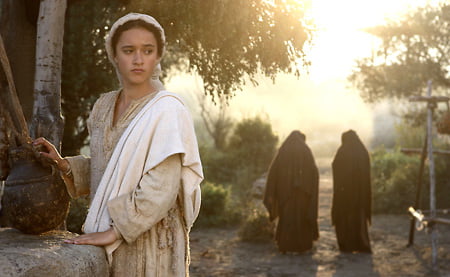 "Mary was greatly troubled at his words and wondered what kind of greeting this might be." (NIV)
"Mary was greatly troubled at his words and wondered what kind of greeting this might be." (NIV)
And this is what we need to know: Mary found herself in a situation that she did not want and that she could not change.
Mary didn't want Joseph to die. If we pick up the book of Tobit-- a book not found in our Protestant scriptures but within the apocrypha held as sacred by our Catholic brothers and sisters-- we read of a popular folk tale that Mary surely would have known. It's the story of a jealous angel who appeared on a bride's wedding night each time she married and killed her bridegroom. One scholar writes, "Against the background of this popular story, the fear of a betrothed girl (Mary) at the appearance of an angel is all the more understandable. Could it be that she thought an evil spirit was threatening her marriage?"[i] Certainly the appearance of an angel before her was nothing that she had ever heard of being a good thing. She hoped that her planned marriage would go to Joseph as had hoped it would.
Then, when Mary was told she would soon be with child, she didn't want to be punished. Being a pregnant before the betrothal period was over was more than a cultural taboo, it was a religious no-no. During the betrothal time, which Mary found herself in with Joseph, she was still living under her father's roof. And, it would be until a year after the betrothal began that she would go to live at Joseph's house and thus have marital relations with him. Thus, for Mary to begin showing her pregnancy from the "overshadowing of the Holy Spirit" would be considered strange, inconceivable and ultimately could cost Mary her life if Joseph didn't claim the baby as his own. The sin of adultery could be placed over her life, unfairly of course.
And, furthermore, Mary probably did not want to be pregnant yet. Though girls married and had children as young as 13 or 14 in this era of time and having children was part of her responsibility to fulfill the laws of the Torah, I can imagine that it wasn't the leap into adulthood that girls like Mary dreamed for themselves. To soon face the potentially life-threatening complications of child-birth when she had not even had time to life much of her own life must have been overwhelming and unfavorable to say the least.
For all of these reasons and probably many more that Mary didn't even have time to think of in this very moment, she found herself in a situation that she didn't want and she couldn't change.
But, what was she to do? Especially as she was learning that this "thing" about to happen to her was from the hands of "the Lord." No longer could she go back to her girly innocence of thinking about goings on in her town. No longer could she be normal just like everyone else. No longer could she silently pray in temple without having to put feet to the words of prayer she had been saying all her life. God was about to change her life. And there were choices in front of her:
1. She didn't have to believe it. She could have said as we heard Zechariah say last week, "How can I be sure of this?" asking for a sign or proof of her pregnancy before she accepted it.
2. She could have balked at this word from the angel. Responding with something like, "No way. You're going to have to find yourself another girl, Gabriel. There ain't no way I am going to carry the 'son of God' in me. That's ridiculous."
And in each of these scenarios, Mary could have found her soul much like the state of my uncle who is dreading the forced gathering with his mother-in-law this Christmas. Bitterness could have crept in. Hatred could have begun to corrode her sweet heart. Having peace, well, Mary would have to kiss that goodbye as she hung on to dreams for her life that would just no longer work for her.
But, then there was another choice and that was to make peace with God. To accept that in our discipleship journey, we might have to endure transitions that are harder than we could have ever imagined. To accept that in this sinful world, often times there are good and even bad things that happen to us that we can't control or make better, as hard as we try. To accept that having this one named Jesus, who would save her people from their sins was the next step for her life.
If we keep reading the text, we know that the final choice-- making peace with God-- was ultimately Mary's chosen path. In verse 38, Mary responds to the angel saying, "Here am I, the servant of the Lord; let it be with him according to your word."
Yet, as quick as the transition is in our text from verse 29 to the acceptance of verse 38, I'd like to think that the transition of this "making peace with God" took longer than it did for Kirby to read this passage for us this morning.
I like to think of Mary as one who joined the great line of saints who were known to wrestle with God when faced with a difficult challenge: Abraham, who didn't want Sodom and Gomorrah destroyed completely, Jacob was willing to fight it out with God until his hip was thrown out of whack, and Hannah who prayed and cried and pleaded until the Lord gave her Samuel, the great prophet of Israel.
That when Mary said, "Here am I... let it be, according to the Lord's word" Mary allowed some things to die. Not in the physical sense of course, but emotionally and spiritually. Letting go of what her expectations and her plans were for her life. Letting go of constantly performing to others' expectations of her. Letting go of hiding innocently in the crowd, believing she was a nobody. Instead, letting peace reign in her being so that her life would exclaim about the Lord, "Let it be." Whatever, you want to come, God, let it be.
Sue Monk Kidd, popular author of the book Secret Life of Bees, writes in her earlier memoir, When the Heart Waits, of her struggle to "let it be." At this juncture in her life she details in the book, perched at middle age with children growing into adolescence and her role as mother and wife changing-- Sue finds herself on a spiritual search to figure out why she was so unhappy. And though it doesn't seem to have a name or a direct cause, Sue begins intentionally stopping more often and seeking to figure out what exactly was going wrong.
And in this process, one afternoon around this time of the year, right before Christmas, Sue went into her attic to get out some Christmas decorations, and found a stack of old Christmas cards in the process. Though she chastises herself upon finding the pile saying, "Why do I insist on being a hoarder of such cards, from as a far back as 15 years ago?" she found herself stopping to re-read some.
As she picked of one of these old cards with a picture of Mary on the front which read on the inside simply, "Let it be," Sue stops and recognizes this moment just for her. Maybe the experience of Mary wasn't as far from her life as she thought. Writing later on: "I sensed that the words were about to take up residence and sing their little aria of letting go."
Sue goes on to make sense of this experience by calling on the wisdom of St. Teresa of Avila. Sue remembers that St. Teresa once compared the soul to a silkworm: "It is necessary for the silkworm to die . . . as it does completing what it was created to do . . . A little butterfly comes forth. Oh, greatness of God! "
And, Sue realized then that God's call for her life was like that of Mary: to let die in her what was of the past, what would not be in the future, so that God could enable new life to spring up in and all around her.
Today, as we sit, also on a journey of waiting, also on a journey of soul-searching called Advent, we too are asked to make peace with God.
I hear people asking me all the time how it is that they can find peace, how it is they can move past the hurt of loss, and how it is that they find God's new plans for them after life-devastating pain. And, to this, I invite us to consider Mary, her witness of making peace with God by letting die in her what could no longer be. Mary ushering in peace, by saying to God, "let it be according to your word."
I can imagine that some if not all of us gathered here today have areas in our life in which we too are in need of peace. And to all of us I say, we too have a choice like Mary did.
So, I ask you what needs to die in you? What do you need to let go? Who do you need to forgive so that as we approach the table this morning, we have the chance to make peace with God?
I hate it that what I must preach this morning is about death to dreams, death to wishes, death to ideas we held dear about our lives-- for death is one of my least favorite things to talk about or to practice myself. But, even with this true, I must tell you today that THIS is the ONLY way to peace. For after all we follow a Christ who died so that we might have life. And, it is our call to way in this way.
Won't you join me at this table this morning. Let us make peace with God before we approach this table as we pray . . .
AMEN
[i] New Interpreters Bible: Luke and John. "Luke 1:26-38 Commentary" 51.